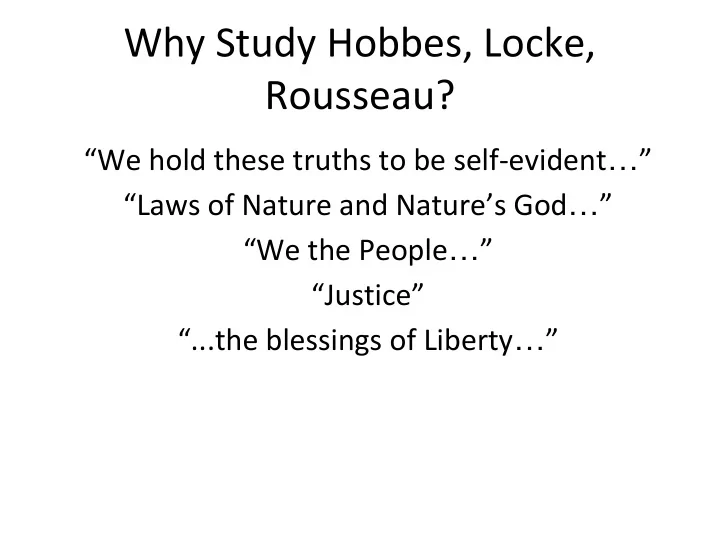

Why Study Hobbes, Locke, Rousseau? “We hold these truths to be self-evident … ” “Laws of Nature and Nature’s God … ” “We the People … ” “Justice” “...the blessings of Liberty … ”
Hobbes’s Questions What is human nature like? What obligations do people have? Where do our obligations come from? Why is there government? What gives a ruler the right to rule? How much power should government have?
Leviathan
“ Fear and I were born twins. My mother hearing of the Spanish Armada sailing up the English channel gave premature birth to me”
1588-1679 Is this our real founding father?
A Bit of Background Hobbes was an Enlightenment thinker. He thought of himself as an innovator and reformer. Why read Hobbes? Because his ideas shape much of modern thought.
The Solution!
New Truths Nature The Mechanical Universe Man A True Science of Human Nature Government The Social Contract
The Mechanical Universe “Everything is either body or it is nothing”
Man “ … life is but a motion of limbs … ” “All Fancies are motions within us, reliques of those made in Sense”
The Social Contract This will be the glue that binds together isolated individuals and creates government by mutual consent.
“ … men have no pleasure, Human Nature (but on the contrary, a According to Hobbes great deal of grief), in keeping company … ” Aristotle: “Man is a political animal.” In short, we don’t naturally get along very well. Hobbes: “Not so much.” Because …
First Principles of Human Nature ❏ Every animal has desires: things it wants to have; things it wants to avoid. Good/bad ❏ Happiness, “felicity”, is continual success in achieving our desires. ❏ Power is the means to obtain our desires/objects of our attraction/ what we call good.
First Principles of the Human Condition ❏ Our desires are extended through time. ❏ Our need for power extends through time ❏ Happiness, or felicity, is never permanent.
In other words... “[T]he object of man’s desire, is not to enjoy once only, and for one instant in time; but to assure forever, the way of his future desire.” Chapter XI
Therefore... “...[I] put it for a general inclination of all mankind, a perpetual and restless desire for power after power, that ceaseth only in death … ” Chapter XI
“Restless desire for power after power” would be one thing if we were alone
What are these other people like? FREE and EQUAL
Take Hobbes’s premises and definitions: 1. The good = what I desire. 2 We all strive to achieve our desires. 3. We are all driven to secure the means to secure our desires over the long term. 4. Every individual is free and equal, with no natural hierarchy and no natural superiority or inferiority sufficient to assure safety. What sort of social relations would result?
State of Nature Human beings are in a state of nature according to Hobbes when they live together without a common authority over every person with the power to keep them all “in awe”.
State of Nature??
State of Nature “ Hearby it is manifest, that during the time men live without a common Power to keep them all in awe, they are in that condition which is called Warre; and such a warre, as is of every man, against every man.” Chap. 13
STATE STATE Of Of NATURE WAR
Life in the state of nature “In such a condition, there is no place for Industry; because the fruit thereof is uncertain; and consequently no Culture of the Earth; no Navigation, nor use of the commodities that may be imported by Sea, no commodious Building; no Instruments of moving, and removing such things as require much force, no Knowledge of the face of the Earth; no account of Time; no Arts; no Letters; no Society, and which is worst of all, continuall feare, and danger of violent death; And the life of man, solitary, poore, nasty, brutish and Leviathan is the lifeblood of modern political short . “ theory, Ignatz Mouse
Recap: Hobbes’s Premises 1.People are sufficiently mentally and physically equal that no one can be completely secure in the state of nature. 2.All people fear death and try to avoid it by whatever means necessary. (This includes ensuring they always have whatever is needed for their security for the long run.) 3.People’s concern for other people is limited, and outweighed by self-concern. 4.People use terms like good and evil to describe what they like and don’t like.
Looking Ahead: Hobbes will propose a theory of inalienable rights. Looking at his premises, how do you think he will justify this? Is there a way it could logically follow?
Recommend
More recommend